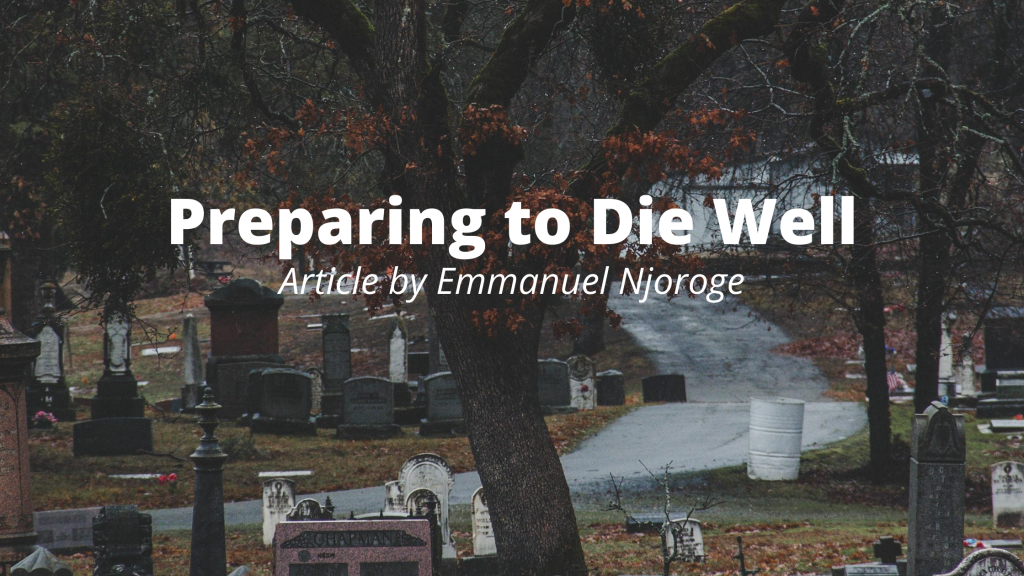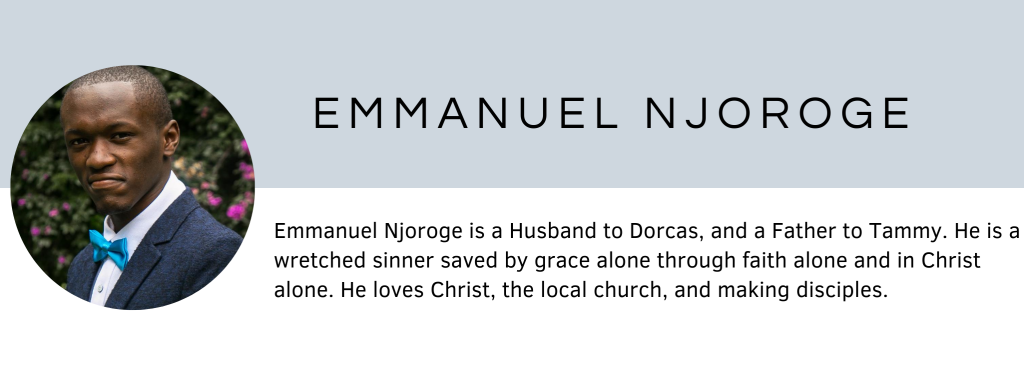
Article by Emmanuel Njoroge
A few books leave an eternal impression in our hearts, one of those books for me is Homeward Bound, Building an attractive Christ-Centered family on eternal principles, by Edward A. Hartman. He wrote the book within the context of his own experience of loosing his wife. He does not write abstractly; he writes from a heart that has felt the pain while at the same time transformed by God through such a pain. In the introduction part of his book, he repeats a particular statement twice: “sometimes the glory of God is displayed most attractively and commended most persuasively through the death of one in a Christ-centered marriage or family.” Is this true? How can it be true? Perhaps what made reading this book a life-transforming experience for me was the fact that Hartman brought me face to face with my greatest unspoken fear: Death.
The Reality of Death
The thought of death is scary. A few days ago, I was walking to church, and on my way, I thought, what if I die today? What will happen to my wife? What about my daughter? I would love to see her grow up into a mature young lady who loves the Lord and is sold-out to the mission of God. I would love to continue watching my wife grow strong in the faith, to be a part of the process of her sanctification, just as much as she is in my sanctification. Yet the reality is that I might actually die any time. My wife might actually die anytime. My daughter might actually die anytime. That time is not known by anyone but God. Death is the last thing most of us want to think about, yet it is here with us. In the recent months, I know of some who have lost their loved ones –a wife and mother, a husband and father, a father and grandfather, a young brother, a young sister. The times we are living in, especially with Covid-19, death is just a breath away for many. Every single day deaths are being recorded in thousands. Not that people don’t normally die, but Covid has uniquely drawn the whole world to the reality of death.
Death reminds us that we will not be here forever. In Hartman’s words,
“no matter how comfortable or content I am, this world, and all that it offers, is not my permanent home…this life is transitional, meaning it is where I now joyfully and gratefully reside, yet with an ever-present expectation of being prepared for that final day when I am welcomed to my new home in heaven.”
If death is inevitable, then those who are wise live by preparing themselves to die well. Not only do they prepare themselves to die well, but they also seek to prepare those whom God brings their way to die well. This is a reality that Hartman helped me appreciate and live in light of.
Four Duties necessary in preparing to die well
Musing on Ecclesiastes 7:1-14, where the author says that ‘the day of one’s death is better than the day of one’s birth’ and musing on William Perkins work, Hartman points out four suggested duties in preparing to die well.
Learn to meditate on death in the time of life.
It is naïve to think that I am immune to death. It is foolish to think that I cannot lose a loved one. Death is inevitable. The Psalmist in Ps. 39:4 asks God to “make me know my end and what is the measure of my days; let me know how fleeting I am.” Moses in Psalm 90:12 similarly asks, “so teach us to number our days that we may get a heart of wisdom.” The believer realizes that this life is temporal and looks at life with a “long view” that goes all the way into eternity.
Make absolutely certain that eternal life is yours.
Often when evangelizing I love asking the question if you died today are you certain that you will be with God for all eternity? Or will you be damned to hell for all eternity? Why or why not? “And this is eternal life, that they know you, the only true God, and Jesus Christ whom you have sent” John 17:3. To have eternal life is to know God in a saving way through Jesus Christ. It is to know that God is holy and you are a sinner, but that Christ died to pay for all of your sins, and therefore, you are now reconciled into a relationship with a holy God. Having been reconciled you are now seeking to live a life that is conforming to God’s revealed will in his Word, in other words, you are leading a life of obedience. Having eternal life is to be saved by grace alone, through faith alone, not of works, in Christ alone unto good works (Ephesians 2:8,10).
Deal radically with sin –both past and present.
The saying goes, “be killing sin or sin will be killing you.” Paul in Romans 8:13 says, “If you live according to the sinful nature, you will die; but if by the Spirit, you put to death the misdeeds of the body, you will live.” It is clear enough that the Christian life is one that is characterized by putting to death the misdeeds of the body. Paul echoes the same in Colossians 3:5, “Put to death, therefore, whatever belongs to the sinful nature.”
Learn to die daily while we are living.
This is the call of discipleship, Luke 9:23, “If anyone would come after me, let him deny himself and take up his cross daily and follow me.” Taking up our cross daily is in other words dying daily, that is, “A dying to our constant insistence upon our own rights. A dying to our unwillingness to suffer for the gospel. A dying to our unwillingness to be inconvenienced or made to feel uncomfortable because of the demands of the cross.”
Here’s a simple truth: if the Lord tarries, you and I will die. At one point or another, our loved ones will die. It is inevitable, but we can prepare ourselves and our loved ones to die well. To die well is to die in Christ, it is to die having the hope of eternal life which is the hope of glory in Christ Jesus our Lord and Savior. Death is only gain for those who are in Christ. Let us then be committed to ensuring that those whom the Lord brings our way –family and friend, know and trust Christ Jesus who is Lord and Savior. Let us pray for our loved ones, preach the gospel to them, that they truly come to a saving knowledge of Christ, so that when they die, they die well in Christ!
